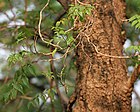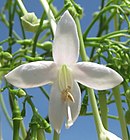Note: This is a project under development. The articles on this wiki are just being initiated and broadly incomplete. You can Help creating new pages.
Millingtonia hortensis
Millingtonia hortensis is a jasmine or Indian cork tree. It is the sole species in the genus Millingtonia. It is a tree native to South Asia & South East Asia. In the name Millingtonia hortensis. It is named for Sir Thomas Millington who was an inspiration to Carl Linnaeus the Younger who first described the genus.
Contents
[hide]- 1 Uses
- 2 Parts Used
- 3 Chemical Composition
- 4 Common names
- 5 Properties
- 6 Habit
- 7 Identification
- 8 List of Ayurvedic medicine in which the herb is used
- 9 Where to get the saplings
- 10 Mode of Propagation
- 11 How to plant/cultivate
- 12 Commonly seen growing in areas
- 13 Photo Gallery
- 14 References
- 15 External Links
Uses
Parts Used
Chemical Composition
The most abundant compounds found were solanesol (25.72%), trans-farnesol (19.71%), nerolidol (8.54%).[2]
Common names
| Language | Common name |
|---|---|
| Kannada | Beratu, ಬಿರಾತೆ ಮರಾ Birate mara |
| Hindi | Neem Chameli |
| Malayalam | Katesam |
| Tamil | Kat-malli |
| Telugu | Kavuki |
| Marathi | NA |
| Gujarathi | NA |
| Punjabi | NA |
| Kashmiri | NA |
| Sanskrit | Akasha Mallige |
| English | Indian Cork Tree, Tree Jasmine |
Properties
Reference: Dravya - Substance, Rasa - Taste, Guna - Qualities, Veerya - Potency, Vipaka - Post-digesion effect, Karma - Pharmacological activity, Prabhava - Therepeutics.
Dravya
Rasa
Guna
Veerya
Vipaka
Karma
Prabhava
Habit
Identification
Leaf
| Kind | Shape | Feature |
|---|---|---|
| Simple | Slightly round-toothed | Each is from 2.5 to 7.5 cm. long. Sometimes the lower pinnae, are again divided and bear one pair of three leaved pinnae. |
Flower
| Type | Size | Color and composition | Stamen | More information |
|---|---|---|---|---|
| Unisexual | Tiny bell-shaped calyx, a long slender tube of palest green dividing into four waxy | Silver white in colour | Many flowers are delicately tinted with rose. Flowering season is June to January |
| Type | Size | Mass | Appearance | Seeds | More information |
|---|---|---|---|---|---|
| The fruit is very long and narrow | Pointed at both ends | It contains thin flat seeds | Many | Fruiting season is June to January |
Other features
List of Ayurvedic medicine in which the herb is used
Where to get the saplings
Mode of Propagation
How to plant/cultivate
Millingtonia hortensis Linn. is cultivated in most parts of India, both in gardens and avenues. Tall and straight, with comparatively few branches, its popularity lies in its ornamental value.[5]
Commonly seen growing in areas
Photo Gallery
References
- ↑ Jump up to: 1.0 1.1 "Karnataka Medicinal Plants Volume - 2" by Dr.M. R. Gurudeva, Page No.460, Published by Divyachandra Prakashana, #45, Paapannana Tota, 1st Main road, Basaveshwara Nagara, Bengaluru.
- Jump up ↑ Sciencedirect
- Jump up ↑ Common names
- Jump up ↑ Wayback machine
- Jump up ↑ Cultivation
External Links
- Ayurvedic Herbs known to be helpful to treat Cholera
- Ayurvedic Herbs known to be helpful to treat Asthma
- Herbs with Stem used in medicine
- Herbs with Bark used in medicine
- Herbs with common name in Kannada
- Herbs with common name in Hindi
- Herbs with common name in Malayalam
- Herbs with common name in Tamil
- Herbs with common name in Telugu
- Herbs with common name in Sanskrit
- Herbs with common name in English
- Habit - Tree
- Index of Plants which can be propagated by Seeds
- Herbs that are commonly seen in the region of Garden area
- Herbs
- Bignoniaceae




